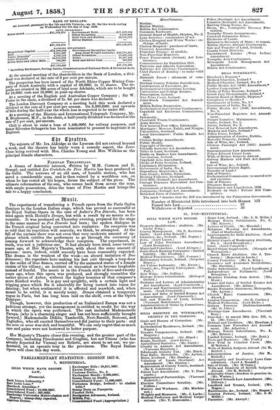usir.
The experiment of transferring a French opera from the Paris Opera Comique to the London Italian stage, which has proved so successful at the Royal Italian Opera in the case of Auber's Fra Dievvolo, has been tried again with Herold's Zampa, but with a result by no means so fa- vourable. It was produced on Thursday evening, prepared for the stage in the same manner as Fra Diavolo had been ; the spoken dialogue in the French original being converted into recitative. Its reception was so cold that its repetition will scarcely, we think, be attempted. At the fall of the curtain there was not even that very moderate amount of ap- plause which entitles the performers to go through the ceremony of coming forward to acknowledge their reception. The experiment, in truth, was not a judicious one. It had already been tried, some twenty years ago, at Her Majesty's Theatre, with about the same amount of success : more, indeed, could scarcely have been reasonably expected. The drama is the weakest of the weak—an absurd imitation of Don Giovanni; the reprobate hero making his last exit through a trap-door in the midst of blue flames, carried off by the animated statue of a female victim of his villany ; an incident so travestied as to become laughable instead of fearful. The music is in the French style of five-and-twenty years ago, when this opera was produced, and strongly resembles the earlier pieces of Auber, without the higher beauties of that composer's more finished works. It is gay and sprightly, with a certain light and tripping grace which fits it admirably for being turned into tunes for dancing; but when sentimental it is affected and mawkish, and, when meant to be awful, it is merely noisy. Zampa obtained a temporary vogue in Paris, but has long been laid on the shelf; even at the Opera Comique. Though, however, this production of an Italianized Zampa was not a iudicious attempt, yet the management is entitled to credit for the way in which the opera was performed. The cast included Mademoiselle Parapa, (who is a e.harming singer and has not been sufficiently brought forward,) Mademoiselle Didiee, Tamberlik, Neri-Baralcli, Ronconi, and Tagliafico, who all exerted themselves and did justice to their parts: and the min en scene was rich and beautiful. We can only regret that so much care and pains were not bestowed to better purpose.
Her Majesty's Theatre closes this evening, and the greater part of the Company, including Piecolomini and Giuglini, but not Titiens (who has already departed for Vienna) nor Belletti, are about to set out, we un- derstand, on an operatic tour in the provinces. The Royal Italian Opera will close this day week.


































 Previous page
Previous page